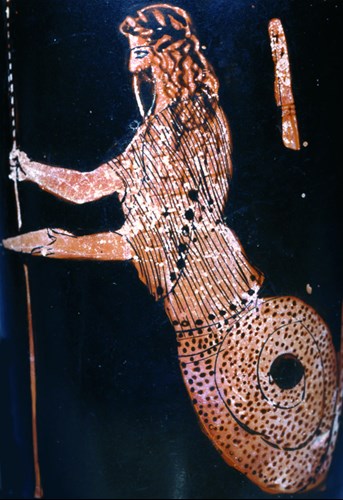Patrios agon
The Eleusinian Mysteries were accompanied by nude, equestrian, and musical competitions, known as the “Patrios Agon” every two and four years. The orator Aristides considers these contests older than the Olympic Games, while the Parian Chronicle traces their beginning to Pandion, son of the mythical king of Athens, Kekrops.

Attic red-figure lekythos: Snake-bodied Cecrops, the first king of Athens, 440-430 BCE, Selinus Painter, vessel, Kiel Christian-Albrechts-University © Kiel Christian-Albrechts-University
The games probably began on a small, local scale (every two years). When Athens brought Eleusis under its control, it proceeded with a broader upgrade of the Mysteries and the games. This theory is reinforced by the fact that the responsibility for the conduct of the games belonged to Athenian officials (eniausioi hieropoioi), who also organised other festivals in Athens. In the Roman period, the games acquired even greater glamour and came under the supervision of specialised officials (agonothetes and panegeriarches).
The prize for the winners was a quantity of barley from the Rharian field, traditionally considered the first piece of land on which the precious gift of the goddess Demeter was sown and harvested. Unfortunately, there is no information on when the games were held. Some researchers associated the “Patrios Agon” with the completion of the harvest when farmers had the opportunity to attend athletic events to honour the goddess for the abundant harvest. In the region of Attica, the harvest is completed in late April or May so that the games could take place in late spring. Recently, scholars associated the athletic contests with the Eleusinian Mysteries but disagreed on whether they were held before or after the religious festival.
Archaeological research has not yet found the buildings associated with the games. The stadium is probably located south of the citadel, beneath the foundations of later industrial facilities erected in the late 19th and early 20th centuries. The altars and shrines that would be associated with the games remain unknown (either they have not been found, or they are some of the extant altars but without the possibility of confirming their use for the religious ceremonies associated with the games).





